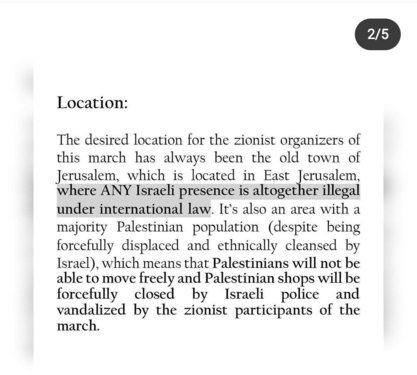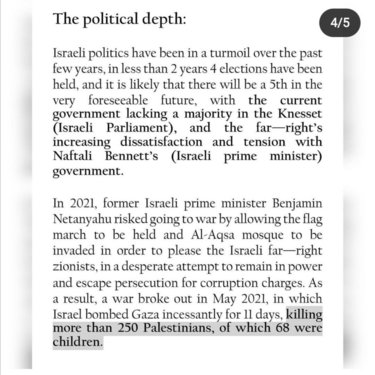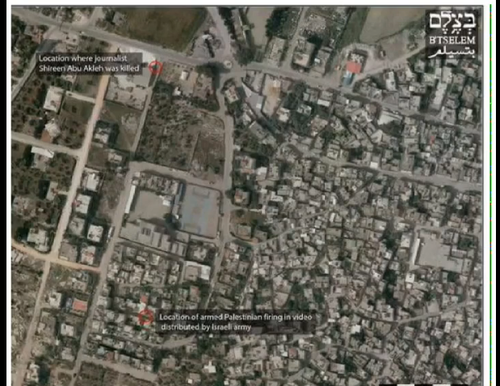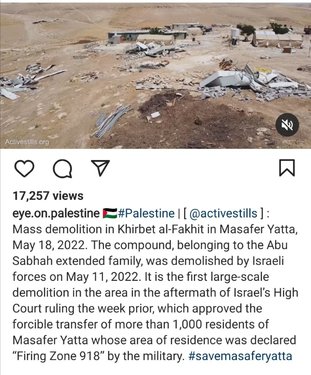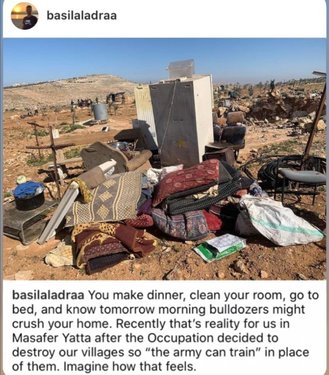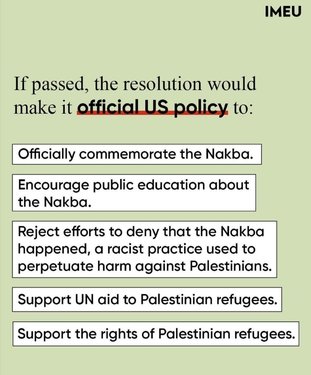-
Posts
8,466 -
Joined
-
Days Won
773
Content Type
Profiles
Forums
Events
Everything posted by ummtaalib
-
News on day of the "flag march" (29 May 2022) Source *The Israeli occupation forces blocked the doors of Al Qibli Prayer Hall at Al Aqsa mosque and besieged worshippers inside it. *The Israeli occupation forces restrict the entry of worshippers and journalists to Al Aqsa mosque *Dozens of Israeli settlers break into Al Aqsa mosque under the protection of occupation forces, including far-right Israeli politician Itamar Ben-Gvir who waved the victory sign *Israeli settlers dance and perform rituals provoking worshippers in the courtyards of Al-Aqsa Mosque.
-
Whats behind the recent crackdown on the Palestinian flag? The Palestinian flag remains the most popular way to express Palestinian solidarity, even when the Israeli occupation criminalises raising or waving it. As the question of sovereignty becomes the talking point for weeks not only in Jerusalem but also within Israel and in the occupied West Bank however, a crackdown on the Palestinian flag has manifest. During the funeral of Abu Akleh on 13 May, Israeli police issued a ban on waving the Palestinian flag. Mourners were assaulted and dragged aside every time a Palestinian flag was seen fluttering among the crowds. A couple of days later, during Nakba commemorations and other pro-Palestine rallies inside Israeli cities, the raising of the Palestinian flag quickly became a matter of political wrangling in the government. Lawmaker Israel Katz warned Palestinians on Tuesday of another Nakba if they fly the Palestinian flag in Israeli universities. Last week, an Israeli settler, protected by soldiers, took a Palestinian flag down from an electricity pole on a busy road in Huwara town near Nablus. The incident has since led to tense confrontations with Palestinians attempting to erect the flag again and facing off with soldiers and settlers. This crackdown on the Palestinian flag is nothing new, Palestinian heritage researcher Hamza al-Aqrabawi said, adding that it is part of a decades-old policy to erase Palestinian identity. "The occupation has since 1967 outlawed the Palestinian flag... used excessive force on the ground and deployed various legal measures to criminalise people for carrying the Palestinian flag, by arresting and detaining some," Aqrabawi told MEE. In this context, Aqrabawi argues that the Flag March has become an important event to Israelis but simultaneously draws out more anger and frustration from the Palestinians. "How can you ban the Palestinian flag at a funeral and attack it, causing [the casket] to almost fall, just because it's draped in a Palestinian flag? Meanwhile, allow this flag march to pass through Damascus Gate which is a Palestinian monument?" Middle East Eye
-
-
By Shaykhul-Hadīth, Hadrat Mawlānā Muhammad Saleem Dhorat dāmat barakātuhum Hajj is one of the fundamental pillars of Islām, and obligatory upon every Muslim male or female who meets its requirements and who has been granted the capability to carry it out by Allāh ta‘ālā. If there are no Dīnī excuses to prevent you from fulfilling the obligation of hajj, you should not delay. Shaytān’s Ploy Every year however, Shaytān whispers the following thought in the minds of those who are under an obligation to go for hajj: ‘I have some important matters preventing me from going this year, but I will definitely go next year, no matter what happens, and I will absolve myself of this obligation.’ In this way Shaytān secures a year’s grace for himself. The following year, just before hajj, he will play the same trick again and secure yet another year. Shaytān misleads people in this manner right up to their graves. It is another cunning ploy of Shaytān that whatever he whispers to people, he never encourages them to rule out the intention of fulfilling any of the Commands of Allāh ta‘ālā. For example, someone who has been neglecting salāh for years will not think to himself that he never intends to perform salāh. Similarly, someone who indulges in drinking alcohol will never think that he is never going to give it up. This is the very condition of many Muslims regarding hajj; not for a moment do they entertain the thought of leaving this world without fulfilling the obligation of hajj, but on the other hand, they never make a firm decision to do it either. The Affection of Rasūlullāh sallallāhu ‘alayhi wasallam for His Ummah Being so affectionate, kind and merciful, anything that would place his Ummah in difficulty bore heavily on Rasūlullāh sallallāhu ‘alayhi wasallam. Allāh ta‘ālā describes this quality in the Qur’ān: At every juncture, Rasūlullāh sallallāhu ‘alayhi wasallam has tried to save us from harm. He sallallāhu ‘alayhi wasallam has said regarding those people upon whom hajj is fard and who have made the intention to go: This is because even when someone makes the intention to go for hajj, Shaytān erects obstacles in his path and whispers all sorts of thoughts and worries into his heart. Our Beloved Nabī sallallāhu ‘alayhi wasallam warned us not to be deterred by these tricks, but to start preparations straight away. Trust in Allāh ta‘ālā Everything is in the Control of Allāh ta‘ālā, and when a servant of His makes the firm intention to go for hajj, He removes all difficulties and obstacles. Some people, misled by Shaytān, worry about their children or their parents, while others worry about their businesses and earnings. All of this is actually a test from Allāh ta‘ālā to see whether His servant is prepared to sacrifice everything in order to fulfil the obligation he has to Allāh ta‘ālā. If you resolve to make these sacrifices, Allāh ta‘ālā will make your heart firm, grant you courage and take over the responsibility of settling all of your affairs. Look at the example of the ‘People of the Cave’ described in the Qur’ān. A handful of young men were up against an idolatrous king and his idolatrous people. There were nothing but obstacles in their path of upholding tawhīd, yet when they rose to the challenge, Allāh ta‘ālā strengthened them and protected them: An Invitation from Allāh ta‘ālā is a Great Honour Allāh ta‘ālā does not invite just anyone to His House; it is a great honour to be given the opportunity to visit the sacred cities of Makkah Mukarramah and Madīnah Munawwarah. If we had true love for Allāh ta‘ālā we would long to visit His House, even if it was not obligatory upon us, and we would be prepared to undergo any hardship to get there. Those who, despite having the means, have not yet received the tawfīq to undertake the journey should be concerned about their condition; could it not be that Allāh ta‘ālā is displeased with them and so does not want them to be guests of His House? Tawbah and istighfār should be made immediately in abundance and humility adopted, beseeching Allāh ta‘ālā to grant them the privilege of visiting the Haramayn. Perform Hajj before it is Too Late We need to consult the ‘Ulamā and Muftīs concerning our own circumstances to find out if we really do have a Dīnī excuse to postpone going for hajj. People postpone hajj for all sorts of reasons: some do not go because they want their parents to perform hajj first; some wives, who have a mahram available to accompany them, put off hajj in order to go with their husbands; some husbands wait for their wives, etc. If a person were to die without having fulfilled the obligation of hajj, there are dire consequences in the Hereafter. Rasūlullāh sallallāhu ‘alayhi wasallam has said: If someone leaves a wasiyyah (bequest) requesting his next of kin to perform hajj on his behalf, it is hoped that Allāh ta‘ālā will grant forgiveness once the hajj is performed, but he is still a sinner for failing to perform hajj despite having the means during his lifetime. (Raddul-Muhtār ‘alad-Durril-Mukhtār) And it is a sad fact that even if a wasiyyah is left, people nowadays have so much love for wealth that they are not prepared to even spend a pound for the sake of their departed parents. They do not have the time or the concern to make the journey, even if the money their parents left them is more than sufficient to cover the costs. Therefore, each individual should ensure that the obligation of hajj is fulfilled at the earliest opportunity. May Allāh ta‘ālā grant a safe journey to all those who are going for hajj this year and grant them al-hajjul-mabrūr (accepted hajj). May He guide those upon whom hajj is fard but who have not yet resolved to go, and may He grant all the necessary means to those who long to go for hajj but are unable to do so. Āmīn. Taken from 'Inspirations' (Volume 1) published by Islāmic Da'wah Academy © Islāmic Da'wah Academy
-
In times of difficulty as well as ease, we are dependent on Allah Ta’ala. When in prosperity, our Nabi (sallallahu’alayhi wasallam) turned in appreciation to Allah, and when difficulty arose, he (sallallahu’alayhi wasalam) always turned only to Allah. In light of the recent xenophobic attacks, hereunder are some du’as from the Quran and Hadith that will be effective in such situations and which will -insha Allah- curb the violence, as such violence can easily over-boil… Quranic Du’as: When Nabi Nuh (‘alayhis Salam) was overwhelmed by the opposition of his people he recited the following du’a: رَبِّ إِنِّيْ مَغْلُوبٌ فَانْتَصِرْ Rabbi inni maghlubun fantasir ‘O Allah I am overpowered, so assist me.’ (Surah Qamar, verse: 10) When Nabi Ibrahim (‘alayhis Salam) left his family in a foreign land, he made this du’a: فاجعل أفئدة من الناس تهوي إليهم ‘O Allah…. turn the hearts of the people in their favour.’ (Surah Ibrahim, verse: 37) To link this du’a to ourselves we should recite the following: رَبَّنا اجْعَلْ أَفْئِدَةً مِّنَ النَّاسِ تَهْوِيْ إِلَيْنا Rabbanaj ‘al af-idatam minan naasi tahwi ilayna ‘O Allah turn the hearts of the people towards us.’ Nabi Ibrahim (‘alayhis Salam) and his followers made the following du’a –which Allah Ta’ala exhorts us to emulate-: رَبَّنا لا تَجْعَلْنا فِتْنَةً لِّلَّذِيْنَ كَفَرُوا وَاغْفِرْ لَنا رَبَّنا إِنَّكَ أَنْتَ الْعَزِيْزُ الحَكِيم Rabbana la taj’al na fitnatal lilladhina kafaru, wagh fir lana rabbana innaka antal ‘azizul hakim. ‘O our Rabb, o not make us a test for the disbelievers, and forgive us o our Rabb, indeed you are most Powerful most Wise.’ (Surah Mumtahinah, verse: 5) When Nabi Musa (‘alayhis Salam) was driven out of his town he recited: رَبِّ نَجِّنِيْ مِنَ الْقَومِ الظَّالِمِيْن Rabbi najjini minal qawmiz zalimin ‘O Allah protect me from the oppressing people.’ (Surah Qasas, verse: 21) The followers of Nabi Musa (‘alayhis salam) made the following du’a when they were under the threat of Fir’awn: رَبَّنَا لا تَجْعَلْنا فِتْنَةً لِّلْقَوْمِ الظَّالِمِينَ وَنَجِّنَا بِرَحْمَتِكَ مِنَ الْقَوْمِ الْكافِرِين Rabbana la taj’alna fitnatal lil qawmiz zalimin, wa najjina birahmatika minal qawmil kafirin ‘O Allah, do not make us a test for the oppressive ones, and rescue us through your mercy from those who do not believe.’ (Surah Yunus, verses: 85-86) Du’a from the Hadith: Whenever Rasulullah (sallalalhu’alayhi wasallam) feared harm from any nation, he would recite the following du’a: اَللّٰهُمَّ إنَّا نَجْعَلُكَ فِيْ نُحُوْرِهِمْ وَنَعُوذُ بِكَ مِنْ شُرُورِهِمْ Allahumma inna naj’aluka fi nuhurihim, wa na’udhu bika min shururihim ‘O Allah, We place you in front of them, and we seek your refuge from their harms.’ (Sunan Abi Dawud and Sahih Ibn Hibban) These du’as should be recited from the heart. We should cry and beg from Allah Ta’ala with the above. In addition to these du’as, we should: Give abundant charity in all forms. This could even be done by assisting those affected by these attacks. By donating aid to these people we will be securing our own safety insha Allah. Show mercy to those on earth, Allah will show you His Mercy. (Hadith) Abstain from sin as much as possible. For sins are the biggest causes of difficulty. May Allah Ta’ala alleviate the sufferings of all mankind throughout the globe. Amin. al-miftah
-
Iraq passes law to criminalise relations with Israel Violators of the anti-Israel law could face penalties including life imprisonment or even the death sentence. 26 May 2022 Iraq’s parliament has passed a law that makes it a crime to normalise ties with Israel, and violations of the law can be punishable with a death sentence or life imprisonment. The law, titled “Criminalising Normalisation and Establishment of Relations with the Zionist Entity”, was approved on Thursday with 275 legislators voting in favour of it in Iraq’s 329-seat assembly. More on Al-Jazeera
-
Wednesday, May 25, 2022 (WAFA) – Two major American media outlets confirmed in two separate reports that Palestinian iconic journalist Shireen Abu Akleh was killed by Israeli army gunfire, and one even suggested that she was deliberately targeted.CNN said that an investigation it has carried into the incident “offers new evidence — including two videos of the scene of the shooting — that there was no active combat, nor any Palestinian militants, near Abu Akleh in the moments leading up to her death.”It said that videos obtained by CNN, “corroborated by testimony from eight eyewitnesses, an audio forensic analyst and an explosive weapons expert, suggest that Abu Akleh was shot dead in a targeted attack by Israeli forces.”Abu Akleh, an American citizen who has been working with Al Jazeera for more than two decades, was covering an Israeli army raid on Jenin refugee camp on May 11 when she was killed and a colleague, Ali Samudi, was injured, after being shot by Israeli soldiers.The Associated Press meanwhile said that the bullet that killed Abu Akleh came from an Israeli gun.“Almost two weeks after the death of the veteran Palestinian-American reporter for Al Jazeera, a reconstruction by The Associated Press lends support to assertions from both Palestinian authorities and Abu Akleh’s colleagues that the bullet that cut her down came from an Israeli gun.”The Palestinian Authority is expected to publish its official investigation into the Israeli murder of Abu Akleh in the near future and submit the evidence to the International Criminal Court to hold Israel accountable for its war crimes in the occupied Palestinian territories, specifically the targeted murder of journalists.Eddie DiFruscia.Free.Palestine (@eddied77) • Instagram photos and videos
-
Q. A family member is on life support and is brain dead for several Months. The doctors have advised us to put him off life support, as there is no hope of his recovery. Is it permissible to put him off life support? (Question published as received) A. If a patient is on a life support machine and after due consultation, the medical experts determine that the condition of the patient is terminal and there is no hope of recovery, it would be permissible to switch off the life support machine (passive euthanasia). However, under no circumstance is it permissible to take the life of the patient by directly being the cause of death like giving the patient a lethal injection (active euthanasia). And Allah Ta’ala Knows Best Mufti Ismaeel Bassa Mufti Moosa Salie (The answer hereby given is specifically based on the question asked and should be read together with the question asked. Islamic rulings on this Q&A newsletter are answered in accordance to the Hanafi Fiqh unless otherwise stated.) Fatwa Department Jamiatul Ulama (KZN) Council of Muslim Theologians
-
Ahed Tamimi and the power of Palestinian women Lamia, Reem, Shaima and Dwlat are powerful Palestinian women just like Ahed, but their stories have been ignored. Ahed Tamimi, the 17-year-old Palestinian activist from the village of Nabi Saleh in the West Bank, is an icon of a rebellious young generation of Palestinians which has demonstrated it has little tolerance for Israel’s persistent violations of their rights and freedoms. After spending eight months in jail for confronting Israeli occupation soldiers in her backyard, Ahed emerged even stronger and more determined to convey the pains and struggles of her people to the world. “The power is with the people, and the people will and can decide their destiny and decide the future,” she said, addressing a crowd of supporters and journalists after her release. Ahed’s story garnered a disproportionate amount of attention from international media outlets which have otherwise often ignored the courage and suffering of numerous Palestinian girls and women living under Israeli military occupation and siege for many years. Recognising this fact, Ahed’s mother, Nariman said: “Frankly it is probably Ahed’s looks that prompted this worldwide solidarity, and that’s racist, by the way, because many Palestinian children are in Ahed’s position but weren’t treated in this way.” There is much truth to this assertion. When Palestinian women are not invisible in Western media coverage, they are seen as hapless victims of circumstances beyond their control – the military occupation of their land and the “backwardness” of their own patriarchal society. They are hardly seen as agents of change; at best, they are presented as trapped in a “conflict” in which they play no part. The invisibility of Arab, Muslim women in Western media is rooted in a long history of colonialism, rife with racist misconceptions and misrepresentations. In the Palestinian case, such misrepresentations undermine the political and humanitarian urgency of the plight of Palestinian women and the Palestinian people as a whole. In truth, Palestinian women are hardly bystanders in the collective victimisation and resistance of the Palestinians, and regardless of their political orientation, religion or residence, they deserve to be made visible and understood within the larger context of the Israeli occupation of Palestine. What follows are the brief stories of four powerful women from Gaza who, despite their struggle and courage, remain invisible to the media. They are raising families, teaching music, protesting at the Gaza-Israel fence, suffering their own losses and injuries, and persevering in the face of a harsh life under the blockade. ‘I will join again the Great March of Return’ – Lamia Ahmed Hussein, 37, Khan Younis When Lamia’s husband, Ghazi Abu Mustafa, was killed by an Israeli sniper on July 27 at the fence separating Gaza from Israel, she was serving in the field as a volunteer paramedic. Lamia is the oldest of nine sisters and brothers. Her family, now residing in the city of Khan Younis in the southern Gaza Strip, is originally from the town of B’ir Al-Saba’a in historical Palestine and, like millions of Palestinians in Gaza and elsewhere, is now permanently exiled. Lamia’s belief in her right of return to her family home in Palestine was what motivated her to join the Great March of Return on March 30, which also marked “Land Day”. Her decision was strongly supported by her husband Ghazi, 43, who also joined the march on its very first day. Lamia offered to volunteer as a paramedic, aiding hundreds of wounded Palestinians every Friday. She knew too well how critical her role could be for those brave fighters and for their families. In the past, her husband was wounded several times while confronting Israeli soldiers. His first injury, which blinded his left eye, was sustained during the largely non-violent mobilisation against the Israeli occupation (1987-1993) known as the First Intifada. In the March of Return, he was repeatedly shot, and with Lamia by his side, he returned to the fence, limping, to stand in solidarity with his people. Lamia and Ghazi faced their challenges together, raised a family in impoverished Gaza and protested side by side as the Gaza march galvanised the whole community, men and women alike, like never before. In July, Ghazi was fatally shot. He died while Lamia was saving the life of another badly wounded protester, Nahid Qadeh. Lamia was devastated but not broken. A life of hardship and pain taught her strength and resilience. “A boat that is dedicated to helping others will never sink,” Ghazi told her one day as they joined a large crowd of protesters at the fence. The widowed mother of six has every intention to resume her work at the fence. “Nothing will shake my belief in my right of return,” she says, a lesson she constantly teaches her children. Although the future of Gaza remains bleak, Lamia’s resolve to achieve justice – for her family, her people and herself – remains unbreakable. ‘I will not stop singing’ – Reem Anbar, 28, Gaza City Reem found her calling during the Israeli war on Gaza in the summer of 2014. She would carry her oud every day from her home to the Sa’id Al-Mashal Cultural Centre, where she would spend hours playing music to frightened children and their families, who were taking shelter from Israel’s incessant bombing. For years, Reem tried to leave Gaza in search of a place where she could pursue her love for music at a respected art institute. Yet, her request to leave was repeatedly denied by Israel. There are thousands of students like Reem who have not been able to pursue educational opportunities outside Gaza for the same reason. Reem has played the oud since she was a little girl. It was her companion, especially during the long nights of the Israeli bombing campaigns. Whenever bombs began to drop, Reem would pick up her instrument and delve into a magical world where notes and rhythms would defeat the unmitigated chaos outside her window. When Israel launched its 2014 assault on Gaza, Reem invited others into her musical world. She played to the traumatised children at the cultural centre, who sang along as Israeli bombs dropped on their homes. When the war ended, Reem continued her work, helping children who were injured and disabled during the war at the same centre and elsewhere. Along with other young artists, she composed musical plays for them and set up performances to help these children overcome trauma and promote their inclusion in society. In late 2017, Reem finally managed to leave Gaza to pursue her higher education in Europe. On August 9, 2018, she heard with a heavy heart that Israel had bombed the Sa’id Al-Mashal Cultural Centre and it had been completely destroyed. Reem plans to return to Gaza when she is finished with her education. She intends to pursue a Master’s degree in music therapy so that she can contribute to the healing of a generation of children scarred by war and siege. “They want to stop us singing,” she says. “But the opposite will happen. Palestine will always be a place of art, history and ‘sumud’ – steadfastness. I swear, we will have our concerts in the street if we must.” ‘I will defeat cancer’ – Shaima Tayseer Ibrahim al-Shamali, 19, Rafah Shaima can hardly speak. Her brain tumour has affected her mobility and her ability to express herself. Yet, she is determined to pursue her degree in Basic Education at Al-Quds Open University in Rafah, in the southern Gaza Strip. The pain that this 19-year-old is enduring is extraordinary even by the standards of poor, isolated Gaza. She is the oldest of five children in a family that fell into poverty following the Israeli siege. Her father is retired and the family has been struggling, but nevertheless, Shaima has been determined to get an education. She was engaged to be married after her graduation from university. Hope still has a way of making it into the hearts of the Palestinians of Gaza and Shaima was hoping for a brighter future for herself and her family. But March 12 changed all of that. On that day, Shaima was diagnosed with an aggressive brain cancer. Just before her first surgery at Al-Makassed Hospital in Jerusalem on April 4, her fiance broke off the engagement. The surgery left Shaima with partial paralysis. She speaks and moves with great difficulty. But there was more bad news; further tests in a Gaza hospital showed that the tumour was not fully removed and it must be quickly extracted before it spreads any further. To make matters worse, on August 12, the Ministry of Health in Gaza announced that it would no longer be able to treat cancer patients in the Israel-besieged enclave. Shaima is now fighting for her life as she awaits Israeli permission to cross the Beit Hanoun checkpoint (called the Erez crossing by Israel) to the West Bank, through Israel, for an urgent surgery. Many Gazans have perished that way, waiting for pieces of paper, a permission, that never materialised. Shaima, however, remains hopeful, while her whole family constantly prays that their eldest daughter prevails in her fight against cancer and resumes her pursuit of a university degree. ‘I will defend my family and my people’ – Dwlat Fawzi Younis, 33, Beit Hanoun Dwlat looks after a family of 11, including her nephews and her gravely ill father. She had to become the main breadwinner of her family when her father, 55, suffered kidney failure and was unable to work. She would look after the entire family with the money she earned as a hairdresser. Her brothers and sisters are all unemployed. She used to help them, too, whenever she could. Dwlat is a fighter; she has always been that way. Perhaps it was her experience on November 3, 2006, that strengthened her resolve. An Israeli soldier shot her while she was protesting with a group of women against the Israeli attack and destruction of the historic Umm Al-Nasr mosque in Beit Hanoun. Two women were killed that day. Dwlat was hit by a bullet in her pelvis, but she survived. After months of treatment, she recovered and resumed her daily struggle. She also never missed a chance to raise her voice in solidarity with her people at protests. On May 14, 2018, when the United States officially transferred its embassy from Tel Aviv to Jerusalem, 60 Palestinian protesters were killed and nearly 3,000 were wounded at the Gaza-Israel fence. Dwlat was shot in her right thigh, the bullet penetrating the bone and cutting through the artery. Her health has deteriorated quickly since then and she is now unable to work. But Israel still hasn’t approved her application to be transferred to Al-Makassed Hospital in Jerusalem to receive treatment. Yet, Dwlat insists she will continue to be an active and empowered member of the Gaza community – for the sake of her family and her people, even if it means joining the protests along the Gaza fence on crutches. In truth, Ahed, Lamia, Reem, Shaima and Dwlat embody the remarkable spirit and courage of every Palestinian woman living under Israeli occupation and siege in the West Bank and Gaza. They endure and persist, despite the massive price they pay and continue the struggle of the generations of courageous Palestinian women who came before them. Al-Jazeera
-

Exams! A Time Of Fear And Anxiety
ummtaalib replied to ummtaalib's topic in General Islamic Articles
Short and Beneficial Advices for Students Sitting Exams By Shaykhul-Hadīth, Hadrat Mawlānā Muhammad Saleem Dhorat dāmat barakātuhum 1. Work hard to achieve the highest possible grades. You will not be able to reach great heights without putting effort into your studies. 2. Manage your time appropriately by making a timetable and a revision plan. Adequate time should be allocated for exam preparation and also for resting and eating, as the mind is not able to function efficiently without sufficient rest and food. 3. Whilst acknowledging that your efforts and preparations alone cannot guarantee success without the Help of Allāh ta‘ālā, turn to Him with utmost humility. Make du‘ā yourself and request your parents, the ‘Ulamā and pious to make du‘ā for you too. 4. Repent and abstain from every disobedience to Allāh ta‘ālā. This is the most important advice as any sort of disobedience will incur the Displeasure of Allāh ta‘ālā and close the doors of His Help. 5. Recite Sūrah Yāsīn in the morning of the exam. It has been narrated that Nabī sallallāhu ‘alayhi wa sallam said, ‘Whoever recites Sūrah Yāsīn in the morning, his needs will be fulfilled.’ (Sunanud-Dārimī) 6. Perform two raka‘āt of salāh before leaving for the exam. Allāh ta‘ālā says, ‘Seek help with salāh and patience.’ (2:45) 7. Give sadaqah (charity) according to your capacity, even it is as little as 10p, 20p or 50p. 8. Whenever the examinations make you worry, recite the following: يَا أَرْحَمَ الرَّاحِمِيْنَ، يَا حَيُّ يَا قَيُّوْمُ بِرَحْمَتِكَ أَسْتَغِيْثُ، حَسْبُنَا اللهُ وَنِعْمَ الْوَكِيْلُ O The Most-Merciful of the merciful! O the Ever-Living! O the Sustainer (of all)! Only through Your Mercy do I seek help. Allāh is sufficient for us and He is the best one in Whom to trust. 9. Begin the exam paper with bismillāh and salāt ‘alan-Nabī. If you get stuck on any question during the exam, then before giving more thought to the question, recite two or three times a short formula of salāt ‘alan-Nabī such as sallallāhu ‘alayhi wa sallam or Allāhumma salli ‘alā Muhammad. Salāt ‘alan-Nabī creates ease and provides a solution for every problem. 10. Show gratitude to Allāh ta‘ālā for whatever you were able to write by performing two raka’āt after the exam. 11. If the exam does not go as well as you desired, then do not become despondent. Remain content with the Decree of Allāh ta‘ālā regarding your exam results and remember that He is the Most-Wise. Inshā’allāh, your efforts along with your obedience to Allāh ta‘ālā will, sooner or later, bring success. I pray that Allāh grant all the students barakah in their studies, success in their examinations and make them true ambassadors of Islam. Āmīn. © At-Tazkiyah Download PDF -
12: Understand The Meaning & Loftiness Of What You Are Saying Understanding what you are saying in your ṣalāh will have a profound impact on your khushūʿ. To do this, try your best to learn Arabic and understand the meaning of what you say. This will make it easier to focus, thereby enhancing your ṣalāh. Along with understanding what you say, be fully mindful when saying it. Ibn ʿAbbās (radiy Allāhu ʿanhumā) said, “Only that which you were mindful of in your ṣalāh will be accepted from you.” Think back to the last time you found yourself in a foreign country where you barely understood the language. Did you feel lost? Similarly, if you do not understand what you are saying in your ṣalāḥ, you will feel out of place and not find the peace, belonging and desire to remain in ṣalāh. Some people avoid learning Arabic as they think it is ‘too difficult’. However, this is not true. Like any other language, it will require effort, commitment and time; but the outcome will be sweet. If you cannot learn Arabic, then, at the bare minimum, memorise and reflect on the meaning of what you say in ṣalāh. This includes: (1) the meanings of the adhkār and (2) the meanings of the small sūrahs. Moreover, even if the above is not currently possible, then think of death and the Day of Judgement. Think of how it will feel to stand before Allah (ʿazza wa jall) on that terrifying day. Recall and reflect on the greatness of Allah (ʿazza wa jall) and bear in mind that He is watching you. Move your lips when reciting Move your lips and tongue when reciting the Qur’ān and the adhkār of ṣalāh. Ensure that you are physically uttering the words in a way that you can hear yourself (assuming you can hear soundly and it is a quiet enviroment). Merely ‘reciting’ in your mind is not sufficient and renders your ṣalāh invalid. Reciting in this manner will help you to concentrate and to repel the whispers of Shayṭān. There is a misconception amongst some that reciting Qur’ān solely in the mind is acceptable (during and outside ṣalāh) and considered ‘recitation’. Others are embarrassed to recite audibly due to fear that their tajwīd is not perfect. However, reciting audibly is the best way to feel the beauty and serenity in Allah’s words. Remember, even if you are struggling with the recitation, Allah al-Ra’ūf (the Most Compassionate) will grant you two rewards: one reward for the recitation, and another for struggling! Reflect on what you are saying Develop khushūʿ by reflecting on the weight and gravity of what you are uttering. The words may be easy to pronounce, and may roll off your tongue effortlessly, but they are in themselves mighty and heavy. The Prophet ﷺ said that subḥānallāh and alḥamdulillāh fill up what is in between the heavens and the earth (Muslim). Though it may be difficult to understand, the words of praise and glorification leave the worldly realms and travel up to the Throne of Allah. These words gather around His throne “buzzing like bees, mentioning to Allah the person who uttered them” (Ibn Mājah). Try to imagine that! Visualise the words that you utter ascending upwards and acting as your representatives. And this is only in the world. Imagine their impact in the hereafter, where they will come to your rescue, protect you from the Hell-fire and guide you to Paradise! A Companion (raḍiy Allāhu ʿanhu) once uttered a sentence of praise in ṣalāh. After the ṣalāh finished, the Prophet ﷺ said that more than 30 angels were competing with each other to ascend with these words to Allah. On another occasion, he ﷺ said that the doors of the heaven opened for a single utterance of the Companion (raḍiy Allāhu ʿanhu) in his ṣalāh! Can you imagine this? One single utterance resulted in the doors of the heaven being opened. Ibn al-Qayyim (raḥimahullāh) wrote, “By Allah, if you could hear the sound of the pens of the angels writing your name amongst those who remember Allah, you would die out of joy.” Likewise, the Qur’ān is the mighty word of Allah (ʿazza wa jall). Allah refers to it as a “weighty discourse” (73:5). It is a lofty book, revealed by the Most High from above. Stored in a lofty place, a lofty angel brought it down and conveyed it to the heart of a lofty man: Muḥammad ﷺ. Therefore, whoever becomes of its people -the people of the Qur’ān- becomes lofty in the sight of Allah (ʿazza wa jall). The Companion Usayd b. al-Ḥuḍayr (raḍiy Allāhu ʿanhu) was reciting Qur’ān at night. His horse became startled and disturbed, so he stopped reciting. The horse calmed down. When he resumed his recitation, the horse once again became agitated. When this happened a few times, he stopped reciting out of fear that his son, who was lying nearby, would be hurt. After completing his prayer, he looked up at the sky and saw something which resembled a cloud with shimmering lamps dangling from the sky to the earth. The next day he came and related what had occurred to the Prophet ﷺ. The Prophet ﷺ told him, “Those were angels who had drawn near you to hear you recite the Qur’ān. If you had continued, by Allah, you would have witnessed astounding things” (Composite: Bukhārī and Ḥākim). In summary, reflect on the greatness of Who you are speaking to and reflect on the greatness of what you are saying. lifewithAllah
-
In an unprecedented and historic move, the resolution formally recognizes the tragedy of at least 750,000 Palestinians who were forced out of their homes and communities in 1948 by armed militias that established the state of Israel on Palestinian land. The resolution is the first time that members of Congress have officially called on the US to recognize Palestinian refugees' right to return to their homes and land. https://www.instagram.com/p/CdoqfCPpzss/
-
15th May - An-Nakba Day What is An-Nakba? 15 May 1948 marks the "Nakba" for the Palestinian people. Nakba means "Catastrophe" in Arabic and refers to the destruction of Palestinian society in 1948 when 78% of historic Palestinian land was seized by Zionists for the establishment of the state of Israel. During the fighting, approximately 750,000 Palestinians were expelled from their homes or fled to escape the violence. Read the story of the Palestinian people HERE Short but comprehensive on Instagram
-
BBC report: Quote: Clashes broke out at the funeral in East Jerusalem of reporter Shireen Abu Aqla, killed in disputed circumstances in the occupied West Bank. As Abu Aqla's coffin was carried aloft from a hospital at the start of her funeral, violence erupted causing it to almost topple. More here Reaction of Palestinians: eye.on.palestine ⚠️ CLASHED? JOSTLED? Were we in a marathon or among an audience of a football game? This dehumanization and gaslighting needs to end. @bbcnews and @cbsnews , have some dignity, shame on such a hateful media. You put the zionist weapons in the same scale the funeral's flowers and the flags of Palestine? What kind of disgusting, racist, and dehumanizing approach is this? The world must put an end for this kind of coverages.
-
11: Fight Shaytan & His Whispers Have you ever started praying and then found yourself suddenly remembering an item you thought you’d lost or a message you’d forgotten to reply to? The Prophet ﷺ stated that these recollections during ṣalāh are the work of Shayṭān. Shayṭān is always busy trying to preoccupy you with thoughts of everything other than Allah (ʿazza wa jall). He ﷺ said, “When the call to prayer is announced, Shayṭān takes to his heels and passes wind loudly so that he does not hear the adhān. When the adhān finishes, he comes back. When the iqāmah is proclaimed, he takes to his heel (again). When the iqāmah finishes, he comes back so that he can obstruct the person’s heart with his whispers, saying ‘Remember such and such, remember such and such,’ things which he did not remember before, to the extent that the person no longer knows how much he has prayed” (Bukhārī). Ṣalāh is a link (ṣilah) to your Lord which your archenemy, Shayṭān, strives to break by any means. Therefore, he comes to you with all kinds of whispers and doubts. Shaytan: The Biggest Thief Shayṭan is like a relentless highway robber. The harder the slave tries to turn to Allah, the harder Shayṭān tries to rob him and divert him from this noble path. It is for this reason that when one of the predecessors (raḥimahullāh) was asked, “Indeed the Jews and Christians say that they do not experience these whispers (in their acts of worship),” he remarked, “They are telling the truth. What will Shayṭān do with a demolished house?” Anyone who turns to Allah (ʿazza wa jall) will be assaulted with these kinds of whispers, particularly during the beginning of your journey where Shayṭān will try his best to divert you. At the start of your journey to Allah (ʿazza wa jall), Shayṭān will have a greater ‘share’ of your ṣalāh than you. You will then compete with him, going back and forth, until you secure half of it. You must then continue to fight until you can secure all of your ṣalāh. The Prophet ﷺ said, “A man returns from his prayer and only a tenth, ninth, eighth, seventh, sixth, fifth, fourth, third or half of it, is recorded for him” (Abū Dāwūd). The initial stages of ṣalāh are the period when Shayṭān will try to convince you that this is a lost battle and there is no hope. Do not give up. Remain steadfast and continue to work on your khushūʿ in ṣalāh. The Deep Concern of the Sahabah ʿUthmān b. Abī al-ʿĀṣ (raḍiy Allāhu ʿanhu) came to the Messenger of Allah ﷺ and said, “O Messenger of Allah, indeed Shayṭān comes in between me and my ṣalāh and my recitation of the Qur’ān and causes me to doubt.” The Messenger of Allah ﷺ told him, “That is a shayṭān known as Khinzab. When you feel his presence, seek Allah’s protection from him and spit lightly to your left three times.” He says, “I did that and then Allah made him go away from me” (Muslim). The aforementioned ḥadīth indicates the importance the Companions (radiy Allāhu ʿanhum) gave to ṣalāh and the matter of khushūʿ. It also highlights the existence of a specific shayṭān who is assigned just for this task, showing us the severity of this matter. Mentally prepare yourself before ṣalāh, and remember you are in a fight with Khinzab. Always be on guard and remember that your enemy is lurking, ready to ambush. How To Fight Whispers 1. Say: أَعُوْذُ بِاللّٰهِ مِنَ الشَّيْطٰانِ الرَّجِيْمِ and spit lightly to your left three times as mentioned in the above ḥadīth. Continue to do this whenever you feel his presence, and not just once in a while. (Avoid spitting during the congregational prayers). 2. Ignore the whispers and carry on praying. Fight back the whispers and do not let them drag you down. 3. Try hard not to yawn during prayer, and if this is not possible, then cover your mouth. The Messenger of Allah ﷺ said, “If one of you yawns during ṣalāh, let him suppress it as much as he can as Shayṭān enters (the mouth)” (Muslim). 4. Force yourself to think of what you are saying. 5. Work hard on the other ways of attaining khushūʿ. They will all aid you in combatting the whispers during your ṣalāh. Some people mentioned to ʿĀmir b. ʿAbdillāh b. Qays (raḥimahullāh) that sometimes they lose concentration during ṣalāh. He went on to ask them, “Do you experience this?” They replied, “Yes.” He replied, “By Allah, I would rather be struck with spears in my stomach than for this to happen to me in my ṣalāh.”
-
Seizing the opportunity On one occasion, Rasulullah (sallallahu ‘alaihi wasallam) visited a Bedouin who received him warmly and honoured him. So, Rasulullah (sallallahu ‘alaihi wasallam) bade him to also visit him. Accordingly, the Bedouin visited Rasulullah (sallallahu ‘alaihi wasallam). Rasulullah (sallallahu ‘alaihi wasallam) said to him, “If you have any need, you may ask me.” The Bedouin replied, “I want a she-camel to use as a conveyance, and a few goats for my family to milk.” Hearing the reply of the Bedouin, Rasulullah (sallallahu ‘alaihi wasallam) addressed the Sahaabah (radhiyallahu ‘anhum) and said, “Why do you not be like the old woman of the Banu Israaeel?” The Sahaabah (radhiyallahu ‘anhum) asked, “O Rasul of Allah (sallallahu ‘alaihi wasallam)! Who was the old woman of the Banu Israaeel and what was her incident?” Rasulullah (sallallahu ‘alaihi wasallam) replied by mentioning the following incident: ‘When Nabi Moosa (‘alaihis salaam) departed from Egypt with the Banu Israaeel, they could not find the road (which they needed to travel on). So Nabi Moosa (‘alaihis salaam) asked the Banu Israaeel, “What is the matter (i.e. why is it that we cannot find the road)?” The learned among the Banu Israaeel answered, “When Nabi Yusuf (‘alaihis salaam) was close to passing away, he made us pledge in the name of Allah Ta‘ala that we will not leave Egypt, without taking his body with us.” Nabi Moosa (‘alaihis salaam) asked them, “Who knows the location of the grave of Nabi Yusuf (‘alaihis salaam)?” They replied that an old woman knew the location. Nabi Moosa (‘alaihis salaam) thus sent for her. When the old woman arrived, Nabi Moosa (‘alaihis salaam) requested, “Guide me to the grave of Nabi Yusuf (‘alaihis salaam).” However, the old woman responded, “(I will not guide you to the grave) until you give me what I want.” Nabi Musa (‘alaihis salaam) asked her, “What is it that you want?” She replied, “I want to be with you in Jannah.” Initially, Nabi Moosa (‘alaihis salaam) was reluctant to accede, but Allah Ta‘ala then sent wahi to him, commanding him to agree to the request of the old woman. The old woman then proceeded with them to a lake and instructed them to drain all the water from it. After they had drained all the water from the lake, she instructed them to dig. They then discovered the grave of Nabi Yusuf (‘alaihis salaam) and recovered his body. Once they removed the body from the grave and carried it with them, the road became as clear as daylight for them.’ (Saheeh Ibni Hibbaan #723) Lesson: Imagine that it was Lailatul Qadr (the Night of Power), or you managed to cling to the Ka’bah at the multazam, and you now had a ‘once in a lifetime chance’ to make a du‘aa that you greatly hope will gain acceptance. What would you ask for? Perhaps many of us would ask for something related to this world such as beauty, health, wealth, a dream home, etc. However, Rasulullah (sallallahu ‘alaihi wasallam) praised the old woman of the Banu Israaeel and encouraged the Sahaabah (radhiyallahu ‘anhum) to be like her. The reason is that when this woman saw the golden opportunity, then instead of asking for something paltry and insignificant, she seized her chance to secure Jannah. Thus, when the hadeeth teaches us to make Dua for all our needs, be they big or small, we should not suffice on asking for only our small needs while neglecting to beg for Jannah. Instead, we must make it a priority to beg for Jannah, as this is the biggest need. uswatulmuslimah
-
Israel is trying to evade the assassination of Shireen Abu Akleh however new field evidence disputes the claim by Israeli occupation forces that they didn't kill the Palestinian Journalist Shireen Abu Akleh. An aerial photo shows the location of where the Palestinian journalist Shireen Abu Aqleh was shot was far away from the Palestinian resistance fighter in the video circulated by the Israeli occupation forces after the shooting. Watch this report of the investigator walking from one spot to the other: www.instagram.com/p/CdbrqVYl57c/
-
Among the awful news coming out of the occupied territories today (and this was a particularly bad day in the life of the occupation), something you're less likely to hear about is that Israeli forces demolished 19 Palestinian homes and structures in Masafer Yatta/Firing Zone 918 in the last few hours. This follows the Supreme Court ruling published last week, which rejected the Masafer Yatta residents' petition against their imminent eviction from their homes so that the area can be turned into a military training zone (see the article link in our story for more details). Today's demolitions may well be the opening shot in the next phase of the State of Israel's campaign to forcibly evict the Palestinian community (of 1,000+ men, women, children) from this area. That is the objective. Military training is just an excuse. breakingthesilenceisrael
-
Shireen Abu Akleh: Al Jazeera reporter killed by Israeli gunfire Israeli forces shot Shireen Abu Akleh in the head while she was on assignment in Jenin in the occupied West Bank. Another Al Jazeera journalist, Ali Samoudi, was also wounded after being shot in the back. He is now in a stable condition, and said that there were no Palestinian fighters present when the journalists were shot, directly disputing an Israeli statement that referenced the possibility. “We were going to film the Israeli army operation and suddenly they shot us without asking us to leave or stop filming,” said Samoudi. “The first bullet hit me and the second bullet hit Shireen … there was no Palestinian military resistance at all at the scene.” Shatha Hanaysha, a Palestinian journalist who was present next to Abu Akleh when she was shot, also told Al Jazeera that there had been no confrontations between Palestinian fighters and the Israeli army, and said that the group of journalists had been targeted. “We were four journalists, we were all wearing vests, all wearing helmets,” Hanaysha said. “The [Israeli] occupation army did not stop firing even after she collapsed. I couldn’t even extend my arm to pull her because of the shots. The army was adamant on shooting to kill.” The circumstances of Abu Akleh’s death are still emerging, but videos of the incident show that she was shot in the head, said Al Jazeera’s Nida Ibrahim. “What we know for now is that the Palestinian Health Ministry has announced her death. Shireen Abu Akleh, was covering the events unfolding in Jenin, specifically an Israeli raid the city, which is north of the occupied West Bank, when she was hit by a bullet to the head,” Ibrahim said, speaking from the Palestinian city of Ramallah. Shireen Abu Akleh sent a message to Al Jazeera’s Ramallah bureau via email at 6:13 a.m. in which she wrote: “Occupation forces storm Jenin and besiege a house in the Jabriyat neighborhood. On the way there, I will bring you news as soon as the picture becomes clear.” Source


